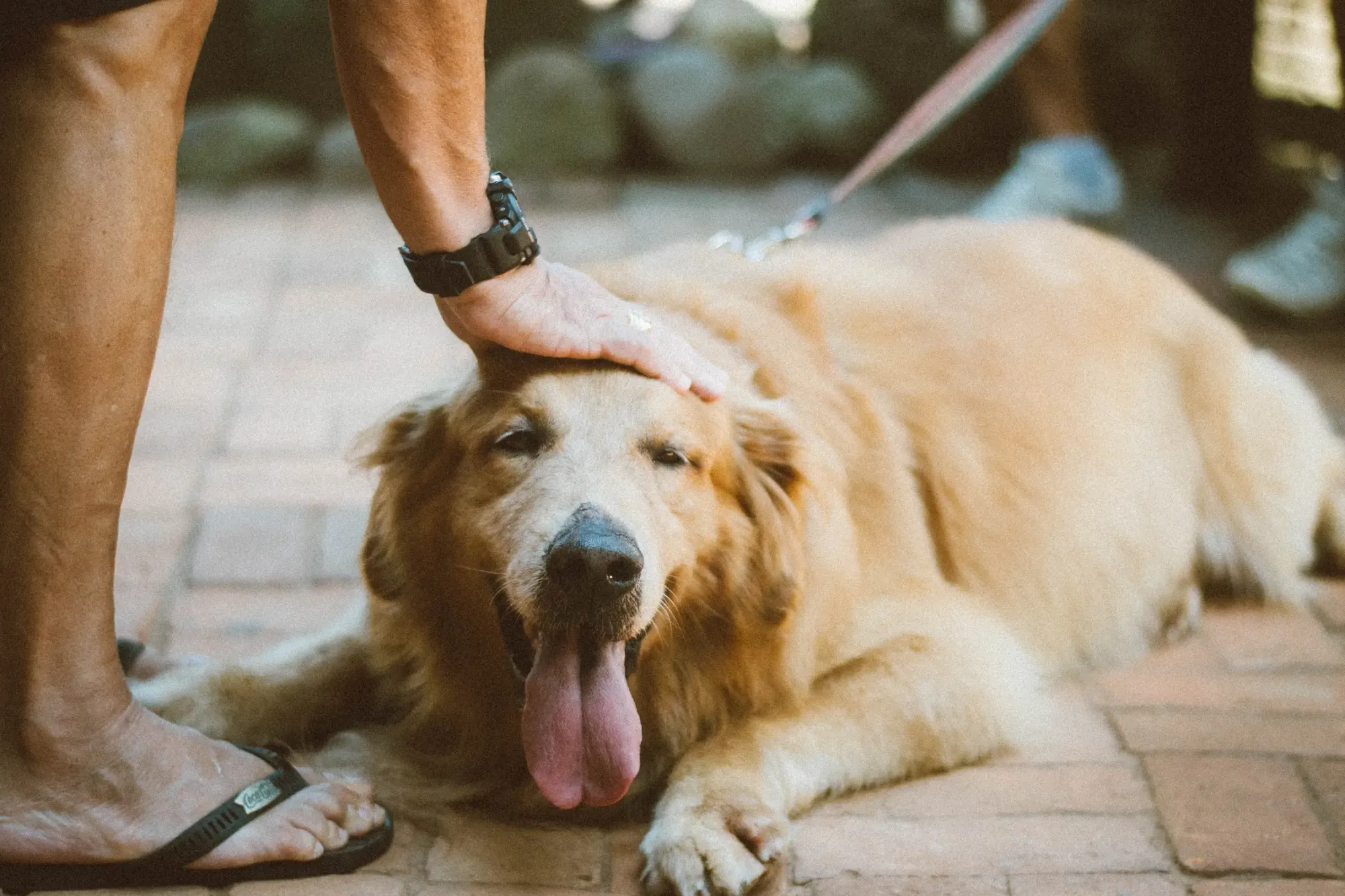Gut Instincts: How to Improve Dog Gut Health -The Doggy Digest Version
Is your furry best friend suffering from tummy troubles? Discover the key to unlocking your dog's digestive health and vitality with these simple yet effective tips. Unleash a healthier, happier pup in no time!

As dog owners, we often pay close attention to our furry friends' diet and exercise routine. However, we may not always consider their gut health. A dog's digestive system plays a crucial role in their overall health and well-being, and gut issues can lead to a range of problems.
Dogs, just like humans, are prone to gut health issues. Digestive and gut problems can cause discomfort, pain, and even lead to severe health problems in dogs. Canine digestive issues can be caused by various factors such as diet, genetics, age, and environmental factors.
In this article, we will explore the types and causes of canine digestion and gut issues, as well as natural ways to improve a dog's gut health. We will also answer some common questions about canine gut health and the microbiome.
So, get ready because this is going to be pawsome! Ok, yep... that joke is pretty horrible. Sounded so much cooler in my head. Leeet's just move on.
WHAT YOU NEED TO KNOW
Types and Causes of Canine Digestion and Gut Issues
The digestive system of a dog is composed of various organs such as the mouth, esophagus, stomach, small intestine, large intestine, pancreas, and liver. When any of these organs fail to function correctly, it can result in digestive issues. Here are some common types and causes of canine tummy troubles
Constipation:
- This is when a dog has difficulty passing stool, which can be caused by a lack of fiber in their diet, exercise, dehydration, or certain medications, and blockages.
Diarrhea:
- Diarrhea is a prevalent digestive issue in dogs. This is when a dog has loose, watery stools. It can be caused by a variety of factors, including dietary changes, bacterial or viral infections, stress, and food allergies.
Inflammatory bowel disease (IBD):
- This is a chronic condition that can cause inflammation and irritation in a dog's gut. Symptoms may include vomiting, diarrhea, and weight loss.
Gastrointestinal (GI) blockages:
- This occurs when something becomes lodged in a dog's digestive system, preventing food from passing through. This can be caused by eating non-food items or bones, which can cause a range of symptoms, including vomiting, diarrhea, and abdominal pain.
Food Allergies:
- Food allergies can cause digestive problems in dogs such as vomiting, diarrhea, and skin issues. The common allergens in dog food include beef, chicken, dairy, and grains.
Pancreatitis:
- Pancreatitis is an inflammation of the pancreas, and it can be caused by factors such as high-fat diets, obesity, and certain medications. It can lead to severe health problems such as organ failure and even death.

Natural Ways to Improve Your Dog's Gut Health
While veterinary care may be necessary in some cases, there are also many natural ways to improve a dog's health and digestion. Some of these include:
Probiotics:
- What are probiotics? They are live and beneficial bacteria that help to improve the gut health of animals and humans. The good news is, they can be found in many dog foods, supplements, and treats. Probiotics work by restoring the natural balance of good bacteria in a dog's gut (to combat the harmful bacteria), balancing the pH levels, which can be disrupted by factors such as diet, stress, or medication.
Prebiotics:
- Prebiotics are non-digestible fibers that serve as food for the bacteria that lives in a dog's gut. They can often be found in healthier foods such as oats, barley, and bananas, and they are also available in supplement products.
Digestive enzymes:
- Digestive enzymes help improve a dog's digestion by breaking down food more effectively, which is really important. You can find them in some dog foods and some supplements.
Bone broth:
- Bone broth is a nutrient-rich liquid. It contains collagen, glucosamine, and chondroitin, which help to improve digestion and reduce inflammation in the gut. It's made by simmering bones and connective tissue, which releases collagen, minerals, and other beneficial nutrients. I know what you're thinking, it sounds mid-evil, but it works well.
Fiber-rich foods:
- Foods that are high in fiber can really help promote gut health by encouraging regular bowel movements and supporting the growth of good bacteria.
Vitamins and Minerals:
- Vitamins and minerals are essential for maintaining a healthy gut in dogs. They help to support the immune system and promote good digestion. You can add vitamins and minerals to your dog's diet by giving them pet supplements or adding foods such as liver, eggs, and leafy greens to their meals.
Omega-3 Fatty Acids:
- Omega-3 fatty acids help to reduce inflammation in the gut. You can add omega-3 fatty acids to your furry friend's diet by giving them fish oil supplements or adding fatty fish such as salmon, sardines, and mackerel to their meals. They will love you for it too!

A CLOSER LOOK
Let's dive in a little deeper about some things you can do to make your dog's gut happy again.
Try raw food: it could have the biggest impact
Thinking of giving raw food to your dog? It can have a significant impact on their gut health. The reason for this is that raw food contains living enzymes, probiotics, and other beneficial nutrients that are generally not present in processed kibble or canned food (no big surprise there!).
These living enzymes and probiotics help to support the growth of healthy bacteria in the gut, which is a big deal when it comes to optimal digestion and overall health.
Many pet owners don't know until it's too late that when dogs consume a diet that is primarily made up of processed foods, their gut microbiome can become unbalanced, leading to a variety of health issues such as diarrhea, constipation, gas, and even inflammatory bowel disease (IBD).
However, raw food is different in that it contains natural sources of enzymes and probiotics that can help to restore the balance of bacteria in the gut, improving digestion and reducing the risk of the above mentioned health issues.
Furthermore, raw food is generally more nutrient-dense than processed food, meaning that dogs can receive a greater range of essential vitamins and minerals with the same portion as dry dog food. This can help to support their immune system, improve their skin and coat health, and reduce the risk of chronic diseases.

How Does Microbiome Testing Work?
Canine microbiome testing is a fascinating area of research that can help us better understand our furry friends' health and well-being. At its core, microbiome testing involves analyzing and studying the bacterial communities (yes that is what they are called - Lol) that live inside a dog's gut, skin, and other parts of their body.
Microbiome testing starts by collecting a sample of your dog's microbiome, which can be done through a few different methods (don't worry, no surgery needed, wink!).
One common approach is to collect a fecal sample, as this provides a good representation of the bacterial communities (there's that term again) in your dog's gut. Other methods may involve taking swabs of your dog's skin, mouth, or other areas.
Once the sample has been collected, it is sent to a laboratory where scientists use advanced techniques to analyze the genetic material of the bacteria present in the sample. This allows them to identify the specific types of bacteria that are present and to determine the relative abundance of each type.
From there, they can compare the results to a database of known bacterial species to gain insights into your dog's microbiome health and how it may be impacting their overall health and wellness.
Overall, canine microbiome testing is an exciting area of research that has the potential to revolutionize the way we approach pet health. By gaining a deeper understanding of our dogs' microbiomes, we can develop better strategies for preventing and treating a wide range of health conditions, leading to happier and healthier lives for our beloved furry friends!

Pay Attention to Dog Food Ingredients
Take some time to read and understand the ingredients in your dog's food. That way can ensure that you're providing them with not only good nutrition, but the right kind for their specific needs.
Look for high-quality sources of protein, such as meat or fish, as well as whole grains and vegetables. Avoid foods that contain fillers or by-products, as these ingredients can provide little nutritional value and may even be harmful.
Additionally, paying attention to ingredients can help you identify potential allergens or sensitivities your dog may have. If you notice that your dog consistently experiences digestive or skin problems, it may be due to an ingredient in their food.
By identifying and eliminating the problematic ingredient, you can help your dog feel their best and prevent any long-term health issues.
Go Grain-Free for Your Dog's Diet
Going grain-free has become increasingly popular in recent years. While dogs are omnivores and can consume a wide range of foods, some owners opt to eliminate grains from their pet's diet for a variety of reasons.
One reason is that some dogs may have a grain sensitivity or allergy, which can lead to digestive issues, skin problems, and other health concerns. By removing grains from their diet, these issues may improve or disappear altogether.
Additionally, some owners believe that a grain-free diet more closely mimics the natural diet of dogs' wild ancestors, which primarily consisted of meat, fruits, and vegetables.
Of course, it's important to note that not all dogs require grain free dog food, and it's always best to consult with your veterinarian before making any significant changes to your pet's nutrition.
Your vet can help you determine if a grain-free diet is necessary for your dog's individual needs and provide guidance on how to make the switch safely and effectively.

Add superfoods for dogs
One great superfood to consider adding to your dog's diet to improve gut health is pumpkin. Not only is pumpkin rich in vitamins A and C, but it's also high in fiber and can help regulate your dog's digestive system (umm, you had me at pumpkin). Plus, the beta-carotene in pumpkin can help improve your dog's vision and boost their immune system.
Lastly, consider adding some oily fish to your dog's diet, such as salmon or sardines (loved by dogs, just not most humans). These fish are rich in omega-3 fatty acids, which can help improve your dog's skin and coat, reduce inflammation, and even improve cognitive function. Remember, just be sure to remove any bones before feeding them to your furry friend.
Dogs Need a High-Protein, Low-Carbohydrate Diet
Dogs are natural carnivores (and some humans think they are, Lol) and require a diet that's rich in protein to support their muscles, tissues, and organs. Protein is essential for building and repairing cells, one thing that slows down as dogs age.
It's also important for maintaining a healthy immune system. By feeding your dog a diet that's high in protein, you're providing them with the building blocks they need to stay strong and healthy.
On the other hand, carbohydrates aren't as essential for dogs. In fact, most pet owners don't know that dogs do not have the digestive enzymes to break down carbohydrates as efficiently as humans do.
Feeding your dog a diet that's high in carbohydrates can lead to weight gain, digestive issues, and even diabetes. By choosing a low-carbohydrate diet, you're helping your dog maintain a healthy weight and reducing their risk of developing health issues associated with excessive carbohydrate intake.

Reduce Stress
As dog owners, we want our furry friends to be happy and stress-free. Unfortunately, just like us humans, dogs can experience stress and anxiety from time to time. But don't worry, there are plenty of things you can do to help your dog reduce stress and feel more relaxed.
One great way to help your dog reduce stress is to make sure they're getting enough exercise. Regular exercise can help your dog release pent-up energy and reduce anxiety. Take your dog for a daily walk or play a game of fetch in the yard to help them burn off some steam.
Another way to reduce stress in dogs is to provide them with a safe and comfortable space to relax. Make sure your dog has a cozy bed or crate where they can go to unwind and feel secure.
You can also consider using calming aids, such as pheromone diffusers or calming music, to help your dog relax (it just might help you at the same time, Lol).
Finally, it's important to provide your dog with plenty of love and attention. Spending quality time with your furry friend can help them feel more secure and reduce their stress levels. Give your dog plenty of hugs, pets, and playtime to show them how much you care.
Remember, every dog is different, and what works for one dog may not work for another. If your dog is experiencing severe stress or anxiety, it's always best to consult with your veterinarian to determine the best course of action.

Try immune-boosting mushrooms
Did you know that certain types of mushrooms can help boost your dog's immune system? We know that sounds kind of out there and what you would expect a hobbit to say (haha), but these little fungi are packed with immune-boosting properties that can help keep your furry friend healthy and happy.
One of the most popular mushrooms for immune support is the shiitake mushroom (that's ok, we slaughtered it on the first time too).
Shiitake mushrooms contain beta-glucans, which are complex sugars that can help stimulate the immune system. These compounds can help your dog's immune cells recognize and fight off pathogens, such as bacteria and viruses.
Another great mushroom for immune support is the reishi mushroom. Reishi mushrooms contain polysaccharides, which are another type of complex sugar that can help boost the immune system. These compounds can help increase the activity of immune cells, making them more effective at fighting off infections.
Finally, you may also want to consider adding some turkey tail mushrooms to your dog's diet. Turkey tail mushrooms contain polysaccharides and other compounds that can help modulate the immune system, among other benefits.
This means they can help support the immune system when it's underactive, but also help reduce an overactive immune response, which can be helpful in dogs with autoimmune disorders.

Use Herbs Instead of Dewormers
Are you looking for an alternative to keeping your best friend parasite-free? One way to do this is by using herbs instead of conventional dewormers to help prevent and treat parasites.
Herbs have been used for centuries to treat a wide range of health issues, including parasite infestations. Many herbs have natural anti-parasitic properties that can help kill and expel worms from your dog's system.
You can often times sneak herbal powder into your dogs daily food, or purchase a pet supplement with the right herbal ingredients included. Some of the most popular anti-parasitic herbs for dogs include wormwood, garlic, and cloves.
Using herbs instead of dewormers can be a safer and more natural alternative for your dog. Conventional dewormers can be harsh on your dog's system and may have unwanted side effects. They often are more expensive as well.
On the other hand, herbs are generally gentler and have fewer side effects, making them a great choice for dogs who may be sensitive to conventional treatments.

How long does it take for things to go through a dog's digestive system?
You may be wondering, "How long does it take for things to go through a dog's digestive system?" Or, you might be reading this thinking, who in the heck would want to know that?
Well, for the latter question the answer is simple. If your dog has eaten something they shouldn't or perhaps simply overate, knowing digestion time frames can help you to better care for them. To answer the former question, it can vary depending on a number of factors.
On average, it takes about 6 to 8 hours for food to pass through a (healthy) dog's digestive system. However, this can vary depending on the size and breed of your dog, as well as the type of food they're eating.
For example, a small dog may have a faster digestive system than a larger dog, while a high-protein diet may take longer to digest than a diet with lower protein levels.
It's also important to note that the digestive process is not just about the time it takes for food to pass through your dog's system. Just like us humans (assuming your not a dog reading this, Lol) the digestive system also plays a critical role in nutrient absorption, waste elimination, and overall good gut health.
That's why it's important to feed your dog a healthy and balanced diet that supports their digestive health.
With a little care and attention, you can help keep your dog's gut and digestive system running as smooth as a dogs bottom (wait... that doesn't sound right. Baby's bottom? Ok yeah, that sounds better) and keep your furry friend healthy and happy for years to come.
Key Takeaways
There are lots of ways you can help your pet feel healthy and have good digestion. Here are the key points to keep in mind:
Feed your dog a balanced and nutritious diet that includes high-quality protein, Omega-3 fatty acids, fiber, and essential nutrients.
Incorporate prebiotics and probiotics into your dog's diet to promote the growth of beneficial bacteria in the gut.
Avoid feeding your dog foods that are high in sugar, artificial preservatives, and fillers, as they can disrupt the gut microbiome.
Provide your dog with plenty of clean water to stay hydrated and support healthy digestion.
Consider adding digestive enzymes or supplements to your dog's diet to aid in the breakdown and absorption of nutrients.
Regular exercise can also help improve gut health by promoting motility in the digestive tract.

